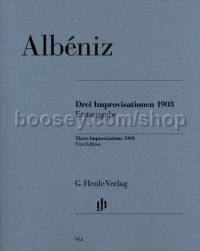Three Improvisations 1903 (Piano)
Three Improvisations 1903 (Piano)
* Estimated price converted from UK retail price
The only surviving original recording of Albéniz’ piano playing is from 1903. On a visit to Ruperto Regordosa Planas he had sat down at the former’s piano and improvised three short pieces. Planas recorded the music on a phonograph cylinder. The pieces were, however, never written down on paper. With the help of modern technical resources, Milton Laufer, an expert on Albéniz, has been able to carefully reconstruct the musical text. Our first printing of the transcription thus enables us to have a unique “peep through the keyhole” into the workshop of the gifted pianist and composer. As a little extra, we have included this fascinating recording on a CD with the first issue of this printing.
Preface
Isaac Albéniz’s (1860–1909) reputation as an exceptional pianist is well documented. His early concert tours of Europe and the New World were received with exuberant acclaim from both audiences and critics. The later musical triumphs at the piano, between 1889 and 1897, firmly cemented his reputation as a virtuoso performer of epic proportions well beyond the Iberian Peninsula. Albeniz's ambitions as a composer grew, and he shifted his focus from writing primarily for the piano to composing zarzuelas and operas.
The period of 1898–1904, however, was one of frustration for Albéniz. His ill-health prompted him to resign his position at the Schola Cantorum in 1900. That same year, his mother Dolores died. Immersed in the creation of an Arthurian operatic trilogy, Albeniz largely abandoned the piano to focus on composing Merlin, Launcelot, and Guenevere in the mold of Wagner’s famous Ring Cycle. This endeavor would prove a significant deviation in his career, particularly after the success Albeniz enjoyed for his previous opera, Pepita Jiménez. Merlin was not performed as Albéniz had envisioned during his lifetime, Launcelot was realized only as a piano and vocal score for the first act, and Guenevere never evolved past the notes he had written in the libretto’s margins. The death of Albéniz’s estranged father Ángel in March of 1903,
the failure of a Catalan theatre project with Enrique Granados, and the tepid interest in his Wagnerian trilogy had a profound effect on the composer.
Written during the late summer of 1903 in the seaside town of Tiana, Albeniz's journal entries underscore the composer’s melancholy. They serve as a stark contrast to his public image as a jovial, playful character. His reflections on faith, love, life, and death pour from the page as indictments against an indifferent God and an equally indifferent humanity. It was precisely during that reflective stay in Tiana when Albeniz visited Ruperto Regordosa Planas and recorded three improvisations on his new Edison phonograph. Invented by Thomas Edison in 1877, Edison phonographs peaked in popularity around 1905, and Edison National continued to manufacture them until 1912. These improvisations are the only extant recordings of Isaac Albéniz. It is easy to speculate on what they present: perhaps thematic material for his operas or zarzuelas, songs, or unwritten pieces for piano solo. It is most likely, however, that they simply were invented at the moment and were thus truly improvisatory.
The editor wishes to thank Zenph Studios’ Dr. John Q. Walker for his suggestion that these cylinders merited further investigation as well as transcription and Eric Hirsh for offering advice on notation to the editor and for copying the handwritten versions into a legible format. The editor is grateful for the access and guidance on the project provided by the Biblioteca de Catalunya, particularly Margarida Ullate Estanyol. He also wishes to extend his gratitude to Peace College for providing the research funding necessary to make this project come to fruition.
Raleigh, North Carolina, USA, Summer 2009 - Milton Rubén Laufer




